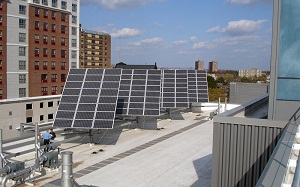Solar pushes back on natural gas in NJ
 There’s an ambiguous perception in New Jersey that ratepayers are carrying the solar industry with subsidies. By nudging the decoupling of Solar Alternative Compliance Payments and Solar Renewable Energy Certificates (SREC) further along, the Christi administration could clear this perception up and address other critical obstacles that keep New Jersey energy prices one of the highest in the nation.
There’s an ambiguous perception in New Jersey that ratepayers are carrying the solar industry with subsidies. By nudging the decoupling of Solar Alternative Compliance Payments and Solar Renewable Energy Certificates (SREC) further along, the Christi administration could clear this perception up and address other critical obstacles that keep New Jersey energy prices one of the highest in the nation.
“The overall view in industry is that the SACP coming down is warranted. How much…20 percent? That’s supposed to happen by 2016. We’re proposing to do it now. This allows the administration to tell ratepayers that they’ve reduced the cost of solar even more,” said Jamie Hahn, managing partner of Solis Partners in Manasquan, N.J.
The common business and political goal in the state is to drive down energy costs. The state imports most of its energy, which is the primary reason for sky-high energy bills. Last November, the Federal Energy Regulatory Commission (FERC) denied the state’s request to funnel ratepayer subsidies into three new power plant projects.
“We are still analyzing the decision, but initially, disappointed that FERC did not rule in our favor. The state is reviewing its legal options and will take the most expeditious, prudent, and appropriate course to protect the interests of the citizens of our state,” said BPU President Lee Solomon.
Since the November decision, the Christi administration has been pushing for subsidies to develop three natural-gas fire plants. This would put ratepayers back in the same predicament they were in with solar. If the Energy Distribution Companies can commit to utility-based projects and own those assets, ratepayers could be scot free.
“The EDCs certainly have the books to build large scale projects. Next year we will probably see PSE&G doing more on brown fields, which benefits ratepayers and businesses,” said Hahn.
The energy mix in New Jersey is in flux.
Natural gas proponents are pushing their agenda, while solar leaders continue to offer up immediate solutions to long-term energy problems.
If it’s really a matter of driving down energy costs to attract businesses and create jobs, Warren Buffet and Google are sending loud “tax equity” signals for solar.
Image courtesy of SolarWorld.



